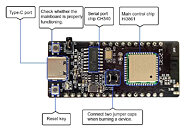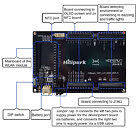Monday, May 24th 2021
HiSilicon Develops RISC-V Processor to Move Away from Arm Restrictions
Huawei's HiSilicon subsidiary, which specialized in the design and development of semiconductor devices like processors, has made a big announcement today. A while back, the US government has blacklisted Huawei from using any US-made technology. This has rendered HiSilicon's efforts of building processors based on Arm architecture (ISA) practically useless, as the US sanctions applied to that as well. So, the company had to turn to alternative technologies. Today, HiSilicon has announced the new HiSilicon Hi3861 development board, based on RISC-V architecture. This represents an important step to Huawei's silicon independence, as RISC-V is a free and open-source ISA designed for all kinds of workloads.
While the HiSilicon Hi3861 development board features a low-power Hi3861 chip, it is the company's first attempt at building a RISC-V design. It features a "high-performance 32-bit microprocessor with a maximum operating frequency of 160 MHz". While this may sound very pale in comparison to the traditional HiSilicon products, this chip is used for IoT applications, which don't require much processing power. For tasks that need better processing, HiSilicon will surely develop more powerful designs. This just represents an important starting point, where Huawei's HiSilicon moves away from Arm ISA, and steps into another ISA design and development. This time, with RISC-V, the US government has no control over the ISA, as it is free to use by anyone who pleases, with added benefits of no licensing costs. It is interesting to see where this will lead HiSilicon and what products the company plans to release on the new ISA.
Sources:
Huawei HarmonyOS Devices, via Tom's Hardware
While the HiSilicon Hi3861 development board features a low-power Hi3861 chip, it is the company's first attempt at building a RISC-V design. It features a "high-performance 32-bit microprocessor with a maximum operating frequency of 160 MHz". While this may sound very pale in comparison to the traditional HiSilicon products, this chip is used for IoT applications, which don't require much processing power. For tasks that need better processing, HiSilicon will surely develop more powerful designs. This just represents an important starting point, where Huawei's HiSilicon moves away from Arm ISA, and steps into another ISA design and development. This time, with RISC-V, the US government has no control over the ISA, as it is free to use by anyone who pleases, with added benefits of no licensing costs. It is interesting to see where this will lead HiSilicon and what products the company plans to release on the new ISA.



39 Comments on HiSilicon Develops RISC-V Processor to Move Away from Arm Restrictions
www.cnx-software.com/2020/10/12/hi3861-based-hispark-wifi-iot-development-board-supports-liteos-and-harmonyos/
Granted, the U.S. of A. caused some disconcern among the Far East tech companies, but the balck suits were relying on some half-a$$ed data. If anything, Huawei will emerge even stronger whether we like it or not.
Interesting times are coming, my friends.
I guess we'll find out at some point. The Tensilica Xtensa CPU core(s) in the ESP32 are quite and old CPU design, seems like the LX used is from 2004, although most likely with some tweaks since then.
In case you're interested you can read up about the architecture below.
mirrobo.ru/wp-content/uploads/2016/11/Cadence_Tensillica_Xtensa_LX6_ds.pdfSorry, what is backfiring?
This chip is nothing interesting and will as I pointed out, most likely not appear in anything sold outside of the PRC.
I wouldn't be surprised if there will be "14nm" 2GHz+ 64 bit RISC-V chips made in China with Chinese materials and tools in the not to distant future. And from there ...
As with every animal that is cornered, it can only claw its way out or it dies.
What the U.S. (seemingly) didn't take into account is the size of Huawei's claws, i.e. the enrmous resources of the Chinese govt.
What Huawei had set to achieve in the next 5 to 10 years, they achieved now. The U.S. (seemingly) forced Huawei's hand, in a way.
Now, Huawei (and the Chinese govt.) will soon have a completely closed cycle of production, i.e. they will be completely independent, hence the backfire.
That's also why they shouldn't be part of infrastructure projects.
Independent in a single market. So what?
No-one sensible is going to buy their Android clone phones, as there are far superior options if that's what you want.
More and more companies globally are banning the use of chips from the PRC in any kind of critical systems.
Let them operate in their home market, I couldn't care less.
Name a superior Android phone, have you tested them all against one another?, do you have data to support your therory?
The tripe you post is bordeline condescending, at times offensive.
I'm willing to bet you a pack of Chinese beer. What do you say?I couldn't agree more.So, intel, AMD, Microsoft, you name it, don't have any kind of backdoors? Let's be sensible here. Everyone is doing it.
We are far from a society that will give up the power voluntary, for a greater good. The Spice must flow, and by Spice I mean money.
I did, great OS unless you are 'Forced' to use crap apps from certain sectors. The same can be said for Linenage OS and the like.
Great operating systems if you want freedom from the Google shackles.
See, gambling is everywhere. At least according to our agreement for the meaning of the term, which is laughable in a completely deterministic or a completely random universe.
They lied and cheated and created something that barely holds together.
Go read any review of a phone with the OS and you'll see.
It's a steaming hot turd compared to all their competitors.
As for spreading propaganda, you seem to the PRC shill here, so... :rolleyes:No, I live in Taiwan, so I always carry an umbrella, as it can always rain.
I don't generally eat soup, so it's not a choice I ever make, as I assume it won't be good.
I always leave in good time to the airport and enjoy the lounge instead of chancing it.
So no, I don't gamble.